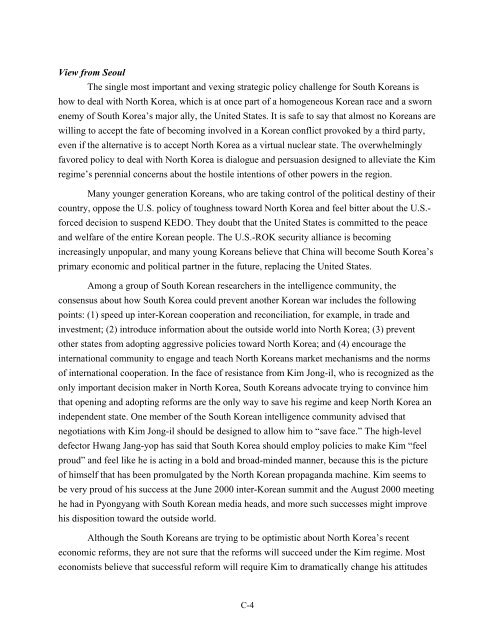North Korean Policy Elites - Defense Technical Information Center
North Korean Policy Elites - Defense Technical Information Center
North Korean Policy Elites - Defense Technical Information Center
Create successful ePaper yourself
Turn your PDF publications into a flip-book with our unique Google optimized e-Paper software.
View from Seoul<br />
The single most important and vexing strategic policy challenge for South <strong>Korean</strong>s is<br />
how to deal with <strong>North</strong> Korea, which is at once part of a homogeneous <strong>Korean</strong> race and a sworn<br />
enemy of South Korea’s major ally, the United States. It is safe to say that almost no <strong>Korean</strong>s are<br />
willing to accept the fate of becoming involved in a <strong>Korean</strong> conflict provoked by a third party,<br />
even if the alternative is to accept <strong>North</strong> Korea as a virtual nuclear state. The overwhelmingly<br />
favored policy to deal with <strong>North</strong> Korea is dialogue and persuasion designed to alleviate the Kim<br />
regime’s perennial concerns about the hostile intentions of other powers in the region.<br />
Many younger generation <strong>Korean</strong>s, who are taking control of the political destiny of their<br />
country, oppose the U.S. policy of toughness toward <strong>North</strong> Korea and feel bitter about the U.S.-<br />
forced decision to suspend KEDO. They doubt that the United States is committed to the peace<br />
and welfare of the entire <strong>Korean</strong> people. The U.S.-ROK security alliance is becoming<br />
increasingly unpopular, and many young <strong>Korean</strong>s believe that China will become South Korea’s<br />
primary economic and political partner in the future, replacing the United States.<br />
Among a group of South <strong>Korean</strong> researchers in the intelligence community, the<br />
consensus about how South Korea could prevent another <strong>Korean</strong> war includes the following<br />
points: (1) speed up inter-<strong>Korean</strong> cooperation and reconciliation, for example, in trade and<br />
investment; (2) introduce information about the outside world into <strong>North</strong> Korea; (3) prevent<br />
other states from adopting aggressive policies toward <strong>North</strong> Korea; and (4) encourage the<br />
international community to engage and teach <strong>North</strong> <strong>Korean</strong>s market mechanisms and the norms<br />
of international cooperation. In the face of resistance from Kim Jong-il, who is recognized as the<br />
only important decision maker in <strong>North</strong> Korea, South <strong>Korean</strong>s advocate trying to convince him<br />
that opening and adopting reforms are the only way to save his regime and keep <strong>North</strong> Korea an<br />
independent state. One member of the South <strong>Korean</strong> intelligence community advised that<br />
negotiations with Kim Jong-il should be designed to allow him to “save face.” The high-level<br />
defector Hwang Jang-yop has said that South Korea should employ policies to make Kim “feel<br />
proud” and feel like he is acting in a bold and broad-minded manner, because this is the picture<br />
of himself that has been promulgated by the <strong>North</strong> <strong>Korean</strong> propaganda machine. Kim seems to<br />
be very proud of his success at the June 2000 inter-<strong>Korean</strong> summit and the August 2000 meeting<br />
he had in Pyongyang with South <strong>Korean</strong> media heads, and more such successes might improve<br />
his disposition toward the outside world.<br />
Although the South <strong>Korean</strong>s are trying to be optimistic about <strong>North</strong> Korea’s recent<br />
economic reforms, they are not sure that the reforms will succeed under the Kim regime. Most<br />
economists believe that successful reform will require Kim to dramatically change his attitudes<br />
C-4













